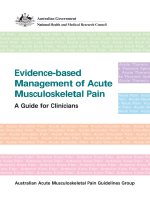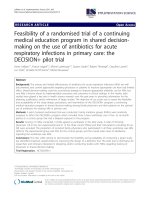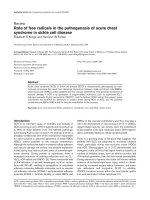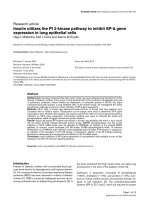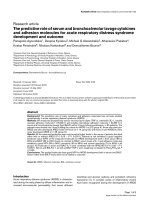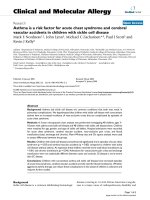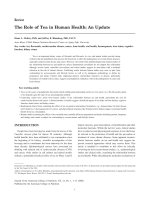ROLE OF MSCT FOR ACUTE CHEST PAIN: UPDATE 2023
Bạn đang xem bản rút gọn của tài liệu. Xem và tải ngay bản đầy đủ của tài liệu tại đây (3.36 MB, 25 trang )
MEDIC
ROLE OF MSCT FOR ACUTE CHEST PAIN: UPDATE 2023
BS CK II. Nguyễn Xuân Trình
Department of Cardiology- MEDIC Medical Center
MEDIC
Case 1
Bình thường
Case 1
MEDIC
Case 1
MEDIC
Hẹp 90% RCA II
MEDIC
Case 2 : Viêm cơ tim, 34M, Mệt, Khó thở, EF giảm, tăng men
tim - CT Đánh giá động mạch vành
MEDIC
Case 2: Viêm cơ tim, 34M, Mệt, Khó thở, EF giảm, tăng men
tim - CT Đánh giá cơ tim
MEDIC
Case 2: Viêm cơ tim, 34M, Mệt, Khó thở, EF giảm, tăng men
tim – MRI tim
MEDIC
Gulati et al. 2021 AHA/ACC Guideline for the Evaluation and Diagnosis of Chest Pain. Circulation.2021;144:e368–e454
MEDIC
Gulati et al. 2021 AHA/ACC Guideline for the Evaluation and Diagnosis of Chest Pain. Circulation.2021;144:e368–e454
MEDIC
MEDIC
C.D. Maroules et al. Journal of Cardiovascular Computed Tomography 17 (2023) 146–163
MEDIC
Michael J Gallagher (2023) . />
CORONARY ARTERY CALCIUM (CAC) TESTING
MEDIC
• Coronary artery calcium (CAC) testing with non-contrast CT is rarely
appropriate as a stand-alone test for the evaluation of ACP in the ED.
• When CAC= 0, the rate of obstructive CAD is low (less than 1%) and
long-term prognosis is favorable.
• However, CAC = 0 cannot exclude ACS, which can occur in 1–3% of
patients who have noncalcified plaque.
C.D. Maroules et al. Journal of Cardiovascular Computed Tomography 17 (2023) 146–163
MEDIC
•
Objective: We evaluated coronary artery calcium (CAC) scoring as an initial diagnostic tool in outpatients and in patients
presenting at the emergency department due to suspected coronary artery disease (CAD).
•
Methods: 10 857 patients underwent CAC scoring and coronary CT angiography (CCTA)
•
Results: the sensitivity, specificity, positive predictive value and negative predictive value (NPV) of CAC=0 for obstructive
CAD were 95.3%, 53.4%, 30.0% and 98.2%, respectively. However, among patients <45 years of age, although the NPV
was high at 98.9%, the sensitivity of CAC=0 for obstructive CAD was only 82.3%.
•
Conclusions: In symptomatic patients, CAC=0 correctly ruled out obstructive CAD and high-risk CAD in 98.2% and 99.4%
of cases. This large registry-based cross-sectional study supports the incorporation of CAC testing in the early triage of
patients with chest pain and as a gatekeeper to further cardiac testing. However, a full CCTA may be needed for safely ruling
out obstructive CAD in the youngest patients (<45 years of age).
MEDIC
Case 3:
53M, chest pain 1 week , hsTroponin T
0.25ng/L, PAPs=74mmHg
PE /MSCT
Suspected PE
MEDIC
Rybicki et al . Appropriate Utilization of Cardiovascular Imaging in Emergency
Department Patients With Chest Pain. J Am Coll Radiol 2016;13:e1-e29
CASE 4
MEDIC
Suspected AAS
MEDIC
Rybicki et al . Appropriate Utilization of Cardiovascular Imaging in Emergency
Department Patients With Chest Pain. J Am Coll Radiol 2016;13:e1-e29
MEDIC
MEDIC
MEDIC
MEDIC
MEDIC
CONCLUSION: CCTA in the ACP
MEDIC
• CCTA has a high sensitivity (98-100%), Specificity 85% , NPV 100%.
• Combined High-risk plaque features and PCAT CT attenuation may allow for Risk Stratification of Patients
With Acute Chest Pain
• CCTA as first test for low-intermediate risk pts with potential ACS
• Combination of hs Troponins and CCTA may play a valuable role in future strategies for the management
of patients with ACP.
•
CCTA demonstrated effectiveness as a safety strategy for evaluation of participants presenting with ACP
• The use of CCTA in low- to intermediate-risk participants was associated with a 17% reduction in length
of stay and a 21% decrease in immediate costs
MEDIC
Thank You
